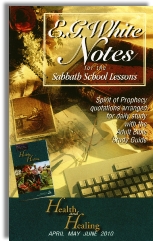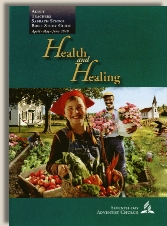|
||||||||||||||
Commentary on "Praise God From Whom All Blessings Flow"
Day 2: Sunday, March 28, 2010
Overview
Sunday’s lesson discusses the fact that God gave humans free will and also devised the plan of salvation as a “warranty on our souls” should humanity make the “wrong choice with the freedom given it”.
The lesson asks the student to “dwell on the implications of the idea that God had prepared the plan of salvation even before the world began,” and it cites 2 Timothy 1:9. Then the student is asked to tell how the text helps us understand what grace is about.
The lesson then comments that God’s love and grace and plan of salvation were in place “to meet the crisis” of man’s sin “when it arrived”. Of course, they say, the cross was the center of the plan.
The lesson ends with the observation that unconditional love is an alien concept to the human heart and is almost always accompanied by an ulterior motive. “Yet, at the same time, if we had to wait until our motives were absolutely pure, we might not get anything done, would we?” Then it asks the student how much time she spends “dwelling on the character of Christ”, and “How could that help you learn to act more and more out of the kind of unconditional love that has been shown to us in Jesus?”
The Teachers Comments observe, on p. 7, that before time began, “Heaven made provisions for the health and happiness of the universe. Those provisions included the priceless offering of God’s very best gift—His Son. Then it asks, “Why is it so important to attempt to comprehend the length and depth and height of the love of God, though it is beyond knowledge?”
It further asks, “Why is it true that the more we comprehend the wideness of God’s generosity, His selfless and unconditional love, the more completely we can respond emotionally to Him and to others? What emotions and attitudes are awakened by meditation on what God has done for us throughout history and in our personal lives?
Observations
The metaphor that the gospel was “a warranty on our souls” is an inside-out comparison. According to the Free Online Dictionary, Thesaurus and Encyclopedia, a warranty is “a written assurance that some product or service will be provided or will meet certain specifications.” From the realm of property law, a warranty can mean, “A covenant by which the seller of land binds himself or herself and his or her heirs to defend the security of the estate conveyed.”
This lesson portrays God’s provision for human sin as a divine promise that He will defend mankind’s right to eternal life. The lesson states that God gave man free will, and it was man’s God-given right to disobey if he chose. Knowing man might “make the wrong choice”, God built into the picture a provision for retrieving mankind from his wrong choice, much as a landowner puts his reputation and money on the line to assure a buyer that he, the buyer, is guaranteed uncontested ownership of the land he has acquired.
In other words, God ensures that man, who got his life from God, will nevertheless be assured that he retains an uncontested right to retain his life should he make a “wrong decision” and place his life in jeopardy. God, the giver of life, acts as the surety for man’s right to have life, a right which God has transferred to man.
In fact, this is not the biblical scenario. God gave Adam explicit instructions. The Tree of the Knowledge of Good and Evil was not Satan’s tree; it was God’s tree. God put it in the garden to remind his new creation, Man, that He was God. They had dominion over all the earth—but God reminded them that He had the last word, and they didn’t have to understand that word. They had to obey it because God is God, and man is man.
The fact that God knew from before creation that He would send His Son to die for sin was not a “warranty”. Life is not a sovereign “right” which God transferred to mankind. Man will always be a recipient of life from an outside Source: God. He does not innately “own” his life or his right to live.
Colossians 1:19: “He is before all things, and in Him [Jesus] all things hold together.”
Acts 17:28: “[F]or in Him we live and move and exist…”
Adam and Eve didn’t simply choose to make a wrong choice. They chose to disobey God’s word to them, and the outcome had been explicitly explained: they would die. God didn’t make a plan to warrant their lives. He made a plan to give them grace—something they didn’t deserve: restoration of life. They didn’t deserve it because they knowingly chose to disobey God. They didn’t simply make an “oops” and discover they made a decision that had unexpected consequences, such as choosing a wrong paint color or not realizing that a discarded piece of paper was really a check for $500.
They chose to disobey.
The plan of salvation was not about a Creator who wanted his creation to be happy and to speak well of Him figuring out a way to keep him happy by giving him a second chance. Rather, salvation was entirely about God’s desire, not man’s reaction to Him. Just as a baby has no desire or thought about life when its parents conceive him, so God’s restoration of man was not about man’s opinion or desire but about God’s sovereign decision to give Himself as payment for man’s overt sin for His own glory—not for man’s happiness. Man's joy results from God's grace but is not the motive for God's grace.
Beholding and Knowing
The Bible never says our motives become increasingly pure by “dwelling on the character of Christ”. Rather, it says we must be born again (John 3:3-5), we must live by the Spirit and surrender the deeds of our flesh to the Spirit (Romans 8), and we must humble ourselves before God and admit we are helpless sinners and receive the Lord Jesus as our Savior. Then we will begin to express love—not as the result of a choice to love and abnegate self, but as the result of having the life of God restored to us because of the blood of Jesus and the indwelling Holy Spirit. Love is only a fruit of the Spirit, not an emotion we exercise (Galatians 5:22-23).
Loving others is not an emotional response that we develop by thinking about Jesus. It is, rather, His will working in our lives as we give up to Him our rights and allow Him to reveal our sin, control, and resistance and open our deepest hearts to Him for healing.
We love only when we allow God to express His love in our lives by revealing our deep sinfulness and bringing us to repentance and surrender to the Lord Jesus and the blood of His cross.
Summary
- The gospel is not a warranty on our souls.
- A warranty guarantees an owner that his rights to what he has (in this case our souls, our very life) will be assured.
- Mankind has no right to be assured of continuing life.
- God instituted the “plan of salvation” not to protect any rights He gave us but to give us His grace for His glory.
- We always exist only in Him—never as an intrinsic “force” granted by God, like real property legally transferred from an original owner to a new owner. Our life is always maintained in God. It is never something we humans have in our own nature.
- We do not develop love by beholding Jesus. We only gain love by receiving Jesus and allowing Him to make us new.
- Our love is never “ours”; true love is part of the fruit of the Spirit. We do not develop it by practice. We receive it by giving up our “rights” to control our lives to the Lord Jesus.
Copyright 2010 BibleStudiesForAdventists.com. All rights reserved. Revised March 26, 2010. This website is published by Life Assurance Ministries, Glendale, Arizona, USA, the publisher of Proclamation! Magazine. Contact email: BibleStudiesForAdventists@gmail.com.
The Sabbath School Bible Study Guide and the corresponding E.G. White Notes are published by Pacific Press Publishing Association, which is owned and operated by the Seventh-day Adventist church. The current quarter's editions are pictured above.
Official Adventist Resources
Standard Edition Study Guide Week 1
Teacher's Edition Study Guide Week 1
Easy Reading Edition Study Guide Week 1
Search the Complete Published Ellen G. White Writings


